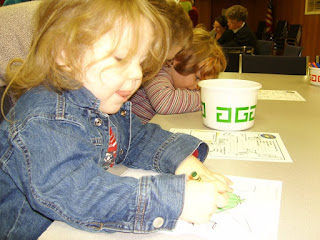[Seek] Peace With What Learning Looks Like
[Lent 16]
Parents' perceptions of what learning looks like differs depending on whether you school or homeschool. Even various types of homeschoolers and unschoolers view learning differently. At times like these, when home learning is necessary for all, it's important to realize what learning really looks like.
One thing I've come to realize is that learning always happens when the child is interested in something, and seldom happens when they aren't. How many times have we "learned" something for a test but not retained it? True learning requires the retention of what they learned, which organically happens when the child seeks knowledge.
Scrolling through the photos on my phone, it's difficult for me not to see learning in many of the photos...
There's art - learning technique, perspective, using their own creativity...
We play games, learning everything from English to math to strategy...
while baking and cake decorating involve chemistry, art, and culinary skills.
We always learn something new when exploring caverns...
and in nature, where we get to witness life cycles of animals and plants, learn survival skills,geology, biology, ecology, and get some exercise along the way.
Sewing, painting, sculpting, and more go into costuming and creating masks and props.
Physics, meditation, patience, balance, and more can be learned and practiced in the not-so-simple act of balancing stones.
Physical therapy for one of our children has fueled her passion for learning about how the body works - and for managing her genetic disorder to lessen pain and optimize health.
What better way to learn about the impact of plastics on the environment AND fashion than with a little trashin' fashion?
And we learn about other countries, cultures, and cuisine through trying new things...
We've had more opportunities for learning when asking "what would you like to explore today?" or "what adventure should we go on today?" than when we've attempted to teach something. And more often than not, if we ask a child to explain something they're trying to learn to us, they'll teach it to themselves in the process. Asking "what are you working on today?" followed by "can you show me how to do it?" has yielded better results than "do this and then show me when you're done."
I used to worry whether or not my children are learning enough, in quantity. Then I realized that I'm re-learning things I supposedly learned throughout my schooling, but wasn't interested in and forgot. Now I am at peace that the learning they are doing is plentiful, and will be meaningful to their lives, staying with them.
Parents' perceptions of what learning looks like differs depending on whether you school or homeschool. Even various types of homeschoolers and unschoolers view learning differently. At times like these, when home learning is necessary for all, it's important to realize what learning really looks like.
One thing I've come to realize is that learning always happens when the child is interested in something, and seldom happens when they aren't. How many times have we "learned" something for a test but not retained it? True learning requires the retention of what they learned, which organically happens when the child seeks knowledge.
Scrolling through the photos on my phone, it's difficult for me not to see learning in many of the photos...
There's art - learning technique, perspective, using their own creativity...
We play games, learning everything from English to math to strategy...
while baking and cake decorating involve chemistry, art, and culinary skills.
We always learn something new when exploring caverns...
and in nature, where we get to witness life cycles of animals and plants, learn survival skills,geology, biology, ecology, and get some exercise along the way.
Sewing, painting, sculpting, and more go into costuming and creating masks and props.
Physics, meditation, patience, balance, and more can be learned and practiced in the not-so-simple act of balancing stones.
Physical therapy for one of our children has fueled her passion for learning about how the body works - and for managing her genetic disorder to lessen pain and optimize health.
And we learn about other countries, cultures, and cuisine through trying new things...
Music is also important to learning - and you learn even more when you build your own ukulele and teach yourself new chords and songs.
And some lessons just spring up on you - or crash down onto your house and van. A tree falling on our house and van inspired many life lessons as we dealt with insurance companies, utility workers, internet/phone providers, firefighters, and more. We've had more opportunities for learning when asking "what would you like to explore today?" or "what adventure should we go on today?" than when we've attempted to teach something. And more often than not, if we ask a child to explain something they're trying to learn to us, they'll teach it to themselves in the process. Asking "what are you working on today?" followed by "can you show me how to do it?" has yielded better results than "do this and then show me when you're done."
I used to worry whether or not my children are learning enough, in quantity. Then I realized that I'm re-learning things I supposedly learned throughout my schooling, but wasn't interested in and forgot. Now I am at peace that the learning they are doing is plentiful, and will be meaningful to their lives, staying with them.















Comments
Post a Comment